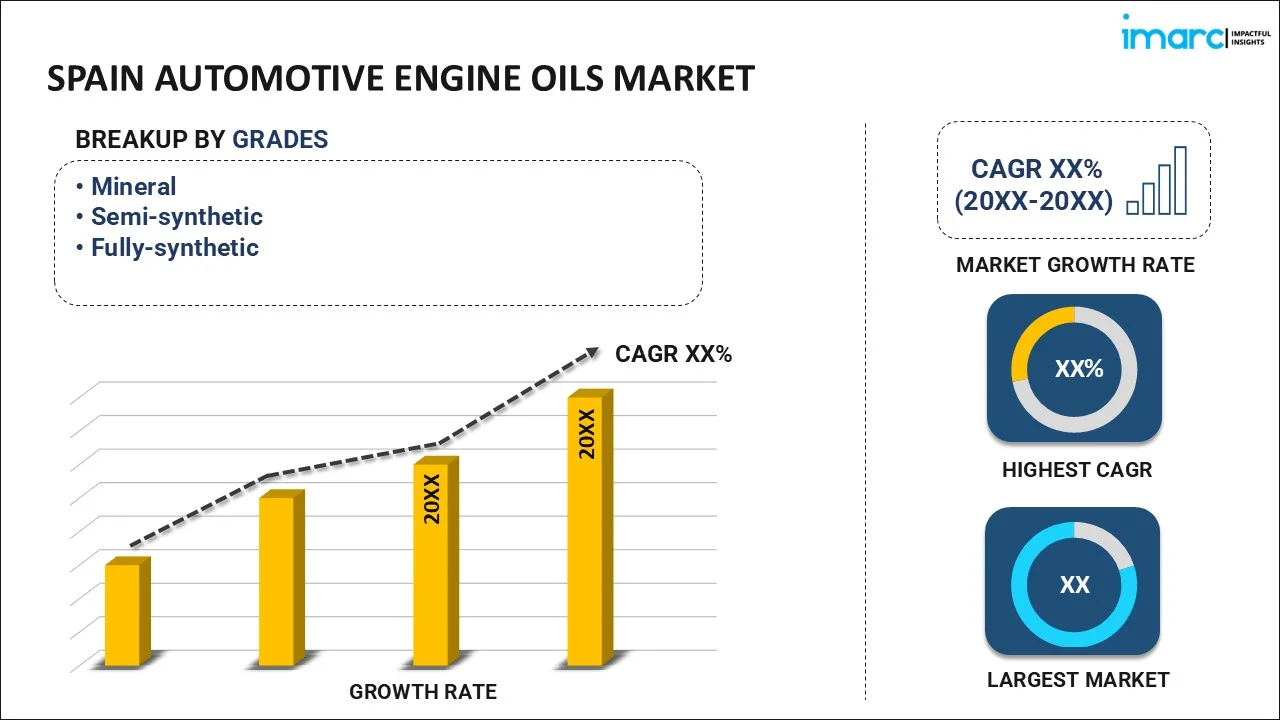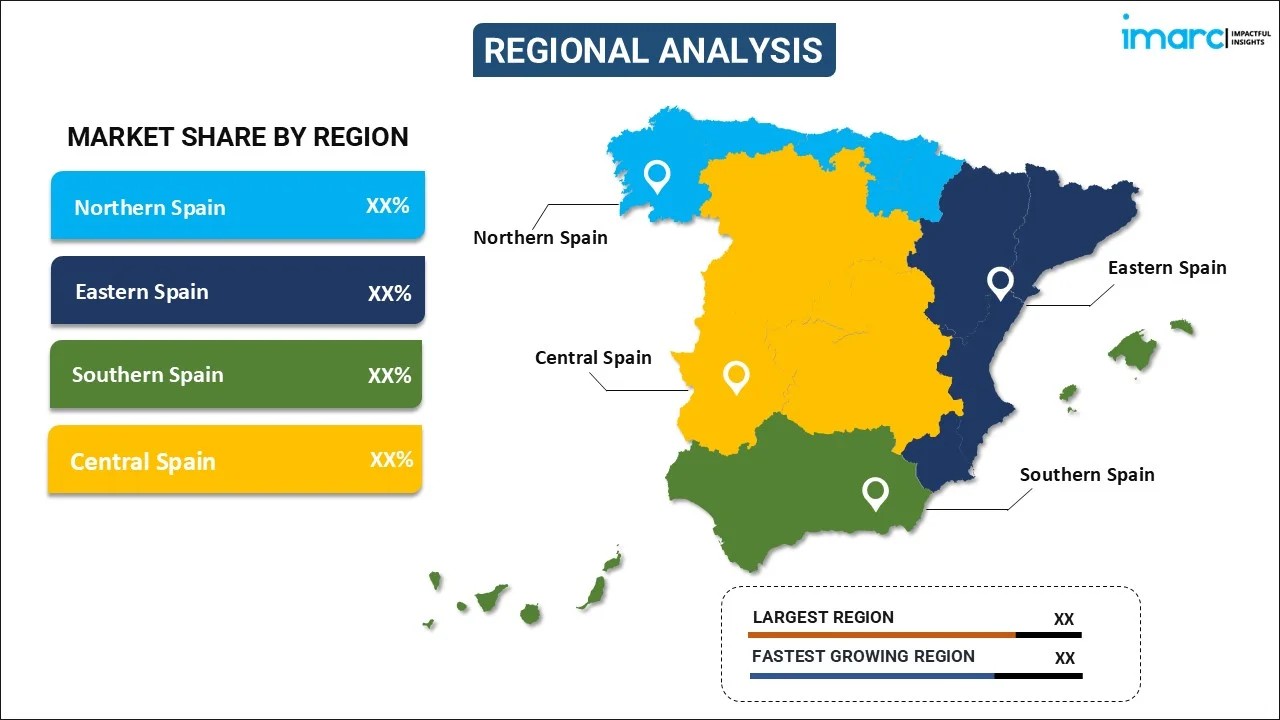
Spain Automotive Engine Oils Market Size, Share, Trends and Forecast by Grade, Engine Type, Vehicle Type, and Region, 2026-2034
Spain Automotive Engine Oils Market Overview:
The Spain automotive engine oils market size reached USD 575.9 Million in 2025. Looking forward, IMARC Group expects the market to reach USD 701.4 Million by 2034, exhibiting a growth rate (CAGR) of 2.21% during 2026-2034. The market is driven by the rising vehicle sales, growing demand for fuel-efficient lubricants, advancements in engine technology, and stringent emission regulations. Increasing preference for synthetic and semi-synthetic oils, expansion of electric vehicle (EV) compatible lubricants, and growing focus on sustainability and recycling are also shaping market dynamics.
|
Report Attribute
|
Key Statistics
|
|---|---|
|
Base Year
|
2025 |
|
Forecast Years
|
2026-2034
|
|
Historical Years
|
2020-2025
|
| Market Size in 2025 | USD 575.9 Million |
| Market Forecast in 2034 | USD 701.4 Million |
| Market Growth Rate (2026-2034) | 2.21% |
Access the full market insights report Request Sample
Spain Automotive Engine Oils Market Trends:
Shift Towards Low-Viscosity and Fuel-Efficient Engine Oils
The demand for low-viscosity engine oils is increasing in Spain due to their ability to enhance fuel efficiency and reduce emissions. As automakers focus on improving engine performance and compliance with Euro 6 emission standards, the use of 0W-20 and 5W-30 synthetic oils has gained prominence. These formulations reduce internal engine friction, improve cold-start performance, and extend engine life. The shift is particularly noticeable in the passenger vehicle segment, where manufacturers prioritize better mileage and lower CO₂ emissions. Additionally, OEM recommendations for high-performance lubricants are accelerating this trend, making full synthetic and advanced semi-synthetic oils more widely adopted across the Spanish market. For instance, the 2024 ACEA Oil Sequences for Heavy-Duty Engines addresses engine advancements, regulatory compliance, and performance needs. A new F01 category is introduced, focusing on viscosity optimization for improved fuel efficiency and emissions control. New claims can be made under this update from December 2024, with mandatory compliance by December 2025. The revision ensures enhanced engine protection, durability, and environmental sustainability, aligning with European emission standards and evolving heavy-duty vehicle technologies.
Expansion of EV-Compatible and Hybrid Vehicle Lubricants
With Spain actively promoting electrification in transportation, the need for EV-compatible lubricants and coolants is expanding. For instance, as per industry reports, Spain's battery electric vehicle (BEV) sales grew 7.8% in 2024, reaching 58,675 units. Passenger BEVs surged 48.2% YoY in December. In line with this, Spain aims for 5.5 Million EVs by 2030, currently at 600,000. The €1.55 billion Moves III subsidy program extends until June 2025, offering up to €7,000 for EVs.Traditional engine oils are being supplemented by specialized e-fluid formulations designed for hybrid and fully electric vehicles. These lubricants ensure thermal management, reduce wear in electric powertrains, and enhance efficiency. Companies are investing in low-conductivity and dielectric fluids that support EV battery performance and longevity. As Spain aims to increase EV adoption, with government incentives and infrastructure expansion, lubricant manufacturers are focusing on developing new-generation oils and transmission fluids tailored to hybrid and battery-electric vehicles (BEVs), creating new market opportunities.
Sustainability and Circular Economy in Lubricant Production
Environmental concerns and regulatory policies are pushing the Spain automotive engine oils market toward sustainable formulations and recycling initiatives. The rise in bio-based and re-refined lubricants reflects industry efforts to reduce dependency on crude oil-based products. Consumers and businesses are increasingly opting for low-carbon lubricants, and manufacturers are developing biodegradable and renewable engine oil solutions. Additionally, waste oil collection and re-refining programs are gaining traction, ensuring that used engine oils are reprocessed and reused in compliance with EU waste management directives. As sustainability takes center stage, Spanish lubricant producers are expected to intensify their research into eco-friendly additives and synthetic base stocks, reducing overall environmental impact. For instance, in February 2025, Repsol introduced biodegradable lubricants to minimize environmental impact in marine and port operations. The MAKER BIO TELEX hydraulic oil and PROTECTOR BIO CALCIUM EP R2 grease are formulated with synthetic esters and biodegradable oils, offering anti-wear protection, corrosion resistance, and high adhesion. Both products meet the OECD 301B biodegradability standard and hold Ecolabel certification for environmental excellence.
Spain Automotive Engine Oils Market Segmentation:
IMARC Group provides an analysis of the key trends in each segment of the market, along with forecasts at the region/country level for 2026-2034. Our report has categorized the market based on grade, engine type, and vehicle type.
Grade Insights:

To get detailed segment analysis of this market Request Sample
- Mineral
- Semi-synthetic
- Fully-synthetic
The report has provided a detailed breakup and analysis of the market based on the grade. This includes mineral, semi-synthetic, and fully-synthetic.
Engine Type Insights:
- Gasoline
- Diesel
- Alternative Fuels
A detailed breakup and analysis of the market based on the engine type have also been provided in the report. This includes gasoline, diesel, and alternative fuels.
Vehicle Type Insights:
- Commercial Vehicle
- Motorcycle
- Passenger Vehicle
A detailed breakup and analysis of the market based on the vehicle type have also been provided in the report. This includes commercial vehicle, motorcycle, and passenger vehicle.
Regional Insights:

To get detailed regional analysis of this market Request Sample
- Northern Spain
- Eastern Spain
- Southern Spain
- Central Spain
The report has also provided a comprehensive analysis of all the major regional markets, which include Northern, Eastern, Southern, and Central Spain.
Competitive Landscape:
The market research report has also provided a comprehensive analysis of the competitive landscape. Competitive analysis such as market structure, key player positioning, top winning strategies, competitive dashboard, and company evaluation quadrant has been covered in the report. Also, detailed profiles of all major companies have been provided.
Spain Automotive Engine Oils Market News:
- In October 2024, Moove, Brazil's lubricant manufacturer, introduced its Comma brand of engine oils and automotive chemicals in Spain. This expansion aligns with its strategy to broaden its product portfolio and strengthen control over its market offerings, as reported by news sources.
Spain Automotive Engine Oils Market Report Coverage:
| Report Features | Details |
|---|---|
| Base Year of the Analysis | 2025 |
| Historical Period | 2020-2025 |
| Forecast Period | 2026-2034 |
| Units | Million USD |
| Scope of the Report |
Exploration of Historical Trends and Market Outlook, Industry Catalysts and Challenges, Segment-Wise Historical and Future Market Assessment:
|
| Grades Covered | Mineral, Semi-synthetic, Fully-synthetic |
| Engine Types Covered | Gasoline, Diesel, Alternative Fuels |
| Vehicle Types Covered | Commercial Vehicle, Motorcycle, Passenger Vehicle |
| Countries Covered | Northern Spain, Eastern Spain, Southern Spain, Central Spain |
| Customization Scope | 10% Free Customization |
| Post-Sale Analyst Support | 10-12 Weeks |
| Delivery Format | PDF and Excel through Email (We can also provide the editable version of the report in PPT/Word format on special request) |
Key Questions Answered in This Report:
- How has the Spain automotive engine oils market performed so far and how will it perform in the coming years?
- What is the breakup of the Spain automotive engine oils market on the basis of grade?
- What is the breakup of the Spain automotive engine oils market on the basis of engine type?
- What is the breakup of the Spain automotive engine oils market on the basis of vehicle type?
- What are the various stages in the value chain of the Spain automotive engine oils market?
- What are the key driving factors and challenges in the Spain automotive engine oils market?
- What is the structure of the Spain automotive engine oils market and who are the key players?
- What is the degree of competition in the Spain automotive engine oils market?
Key Benefits for Stakeholders:
- IMARC’s industry report offers a comprehensive quantitative analysis of various market segments, historical and current market trends, market forecasts, and dynamics of the Spain automotive engine oils market from 2020-2034.
- The research report provides the latest information on the market drivers, challenges, and opportunities in the Spain automotive engine oils market.
- Porter's Five Forces analysis assist stakeholders in assessing the impact of new entrants, competitive rivalry, supplier power, buyer power, and the threat of substitution. It helps stakeholders to analyze the level of competition within the Spain automotive engine oils industry and its attractiveness.
- Competitive landscape allows stakeholders to understand their competitive environment and provides an insight into the current positions of key players in the market.
Need more help?
- Speak to our experienced analysts for insights on the current market scenarios.
- Include additional segments and countries to customize the report as per your requirement.
- Gain an unparalleled competitive advantage in your domain by understanding how to utilize the report and positively impacting your operations and revenue.
- For further assistance, please connect with our analysts.
 Request Customization
Request Customization
 Speak to an Analyst
Speak to an Analyst
 Request Brochure
Request Brochure
 Inquire Before Buying
Inquire Before Buying




.webp)




.webp)












